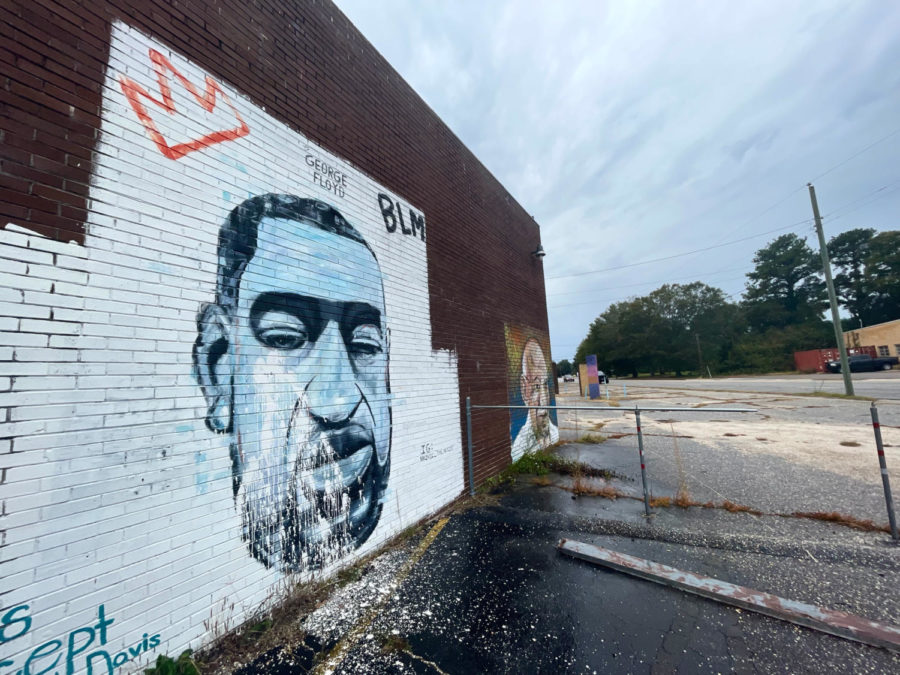AAFSC opens Cultural Conversations to the students
Photo by: MaKayla O’Neal
A mural of George Floyd lies on the side of an abandoned building in Downtown Florence.
The African-American Faculty and Staff Coalition (AAFSC) hosted their first Cultural Conversation luncheon and series of the 2021-22 academic year at 11:15 a.m. on Monday, Oct. 18 at the FMU Performing Arts Center (PAC).
The Cultural Conversations were created by the AAFSC in response to the death of George Floyd in 2020 to give minorities on campus more resources and a sense of community.
“We wanted to provide the FMU and Florence community with a healthy way to process and discuss these issues that are plaguing our nation,” Kayla Duncan, assistant director of the Counseling and Testing Center, said. “We felt the only way to get through this difficult time would be to create a safe space for learning, open discussion, and processing for community members. Our motto for the Coalition is ‘together, we can,’ and we knew that was the only way we could get through this time: together.”
Duncan was one of the movement’s leaders in its origin and continues to expand the event to reach a larger audience. The AAFSC’s goal is to help educate the community of Florence and increase the dialogue surrounding prevalent racial issues.
“The purpose of the Cultural Conversations is to increase the knowledge base of the FMU community and Florence community as a whole regarding the current racially charged climate,” Duncan said. “We hope that they serve as ways for people to get researched information from experts related to some of the most pressing issues of today.”
This year’s Cultural Conversations will run differently, as students are now welcome to join. Duncan emphasized the importance of the students keeping an open mind in the discussions and wants the students to feel comfortable asking questions during the panels.
“We determined that the students needed to also be involved in this learning,” Duncan said. “You all are the future of this country, and are just as much a part of the overall discussion as anyone else.”
With the student attendance, Duncan and the AAFSC look to further educate the Florence community and entice further participation. The AAFSC plans to continue the Cultural Conversations annually, hopefully gathering more participants as time passes.
With a more established program, Duncan is confident in the purpose of the Cultural Conversations and believes they are helping to enlighten the participants in the community on the realities of other people.
“It can be easy as an individual to only see things through your perspective or life lenses, rather than allowing in multiple perspectives,” Duncan said. “I think these conversations help open peoples’ views to more than just their own, which in my mind leads to people seeing others as ‘a part of’ and not ‘other than.’”
The first meeting, titled “Slavery’s Legacy, Past and Future,” was hosted by Erica Edwards, associate professor of history, and Louis Venters, professor of history and pre-law program coordinator. Future sessions will cover topics about racial inequity, beauty standards and the development of race and ethnicity.
The second Cultural Conversation of the series, titled “Bordering Democracy: Racial and Class Inequality in Access to Political and Public Squares,” will be hosted by Jennifer Titanski-Hooper, assistant professor of geography, and Dillon Tatum, assistant professor of political science, on Thursday, Nov. 18 at the PAC.
